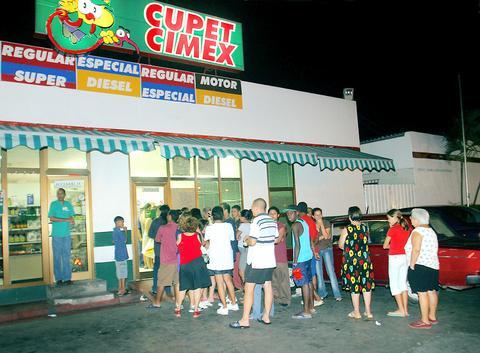Officials suddenly halted most of the dollar sales that Cubans have come to count on and warned of higher dollar prices for food and gasoline. They blamed new US measures meant to undermine the island's government.
Scores of agitated people lined up for last-minute purchases at late-night variety stores after the official declaration was read on Cuban state television shortly before 8pm Monday night.

PHOTO: AP
The measure could have dramatic effect on everyday life in Cuba, where hard-currency stores offer plentiful goods -- from soap to spark plugs -- that are available in scant quantities, if at all, at highly subsidized prices in Cuban pesos.
Except for food, gasoline and personal hygiene products, the announcement said, sales in dollars "are suspended until further no-tice." It was not clear if they would resume at some point.
It also said that dollar prices would be raised on food and gasoline -- and perhaps other products if the stores reopen. Prices in pesos, the government said, would remain stable.
Crucially, food and personal hygiene products were exempted.
Cuba blamed the measure on "the brutal and cruel" measures adopted last week by US President George W. Bush to strengthen the embargo of Cuba and to hasten the end of the country's communist government.
The announcement said the US proposals "are directly aimed at strangling our development and reducing to a minimum the resources in hard currency that are essential for the necessities of food, medical and educational services and other essentials."
Many analysts had seen the Bush measures as a relatively modest tweak to the broad US economic embargo that has been in place against Cuba since the early 1960s.
Bush said Cuban-Americans now can visit relatives on the island once every three years rather than once a year. They can spend US$50 a day rather than the earlier limit of US$164. Visits and money transfers are limited to immediate family members -- excluding uncles and cousins -- and officials and Communist Party members cannot receive funds. More money would be allotted for dissidents.
Cuban officials have warned the measures could be a possible prelude to stronger US attacks, possibly even an invasion.
A permanent closure of the dollar stores could be another step back from the liberal reforms enacted in the early 1990s to cope with the loss of aid and trade Cuba had enjoyed with the Soviet Union.
Possession of dollars was legalized in 1993 to draw dollars from growing tourism and family remittances into the state stores. The government has steadily offered more and more goods in the US currency while the Cuban ration book of items available in pesos has withered.
Many of those lined up Monday night at shops built into gas stations were buying cooking oil and soap before prices rise. Most expressed frustration at the measures.

VAGUE: The criteria of the amnesty remain unclear, but it would cover political violence from 1999 to today, and those convicted of murder or drug trafficking would not qualify Venezuelan Acting President Delcy Rodriguez on Friday announced an amnesty bill that could lead to the release of hundreds of prisoners, including opposition leaders, journalists and human rights activists detained for political reasons. The measure had long been sought by the US-backed opposition. It is the latest concession Rodriguez has made since taking the reins of the country on Jan. 3 after the brazen seizure of then-Venezuelan president Nicolas Maduro. Rodriguez told a gathering of justices, magistrates, ministers, military brass and other government leaders that the ruling party-controlled Venezuelan National Assembly would take up the bill with urgency. Rodriguez also announced the shutdown

Civil society leaders and members of a left-wing coalition yesterday filed impeachment complaints against Philippine Vice President Sara Duterte, restarting a process sidelined by the Supreme Court last year. Both cases accuse Duterte of misusing public funds during her term as education secretary, while one revives allegations that she threatened to assassinate former ally Philippine President Ferdinand Marcos Jr. The filings come on the same day that a committee in the House of Representatives was to begin hearings into impeachment complaints against Marcos, accused of corruption tied to a spiraling scandal over bogus flood control projects. Under the constitution, an impeachment by the

Exiled Tibetans began a unique global election yesterday for a government representing a homeland many have never seen, as part of a democratic exercise voters say carries great weight. From red-robed Buddhist monks in the snowy Himalayas, to political exiles in megacities across South Asia, to refugees in Australia, Europe and North America, voting takes place in 27 countries — but not China. “Elections ... show that the struggle for Tibet’s freedom and independence continues from generation to generation,” said candidate Gyaltsen Chokye, 33, who is based in the Indian hill-town of Dharamsala, headquarters of the government-in-exile, the Central Tibetan Administration (CTA). It

China executed 11 people linked to Myanmar criminal gangs, including “key members” of telecom scam operations, state media reported yesterday, as Beijing toughens its response to the sprawling, transnational industry. Fraud compounds where scammers lure Internet users into fake romantic relationships and cryptocurrency investments have flourished across Southeast Asia, including in Myanmar. Initially largely targeting Chinese speakers, the criminal groups behind the compounds have expanded operations into multiple languages to steal from victims around the world. Those conducting the scams are sometimes willing con artists, and other times trafficked foreign nationals forced to work. In the past few years, Beijing has stepped up cooperation